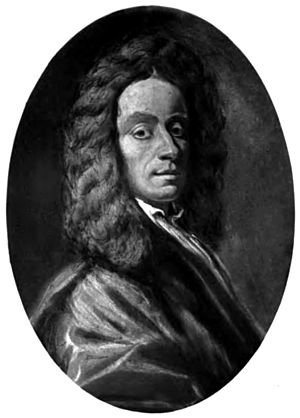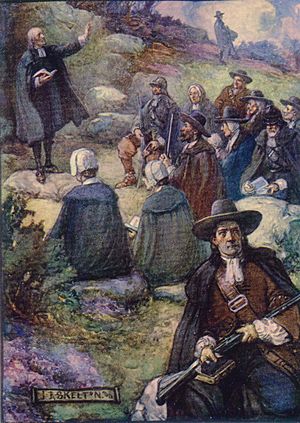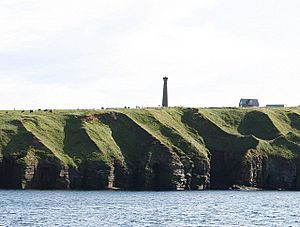John Spreul (apothecary) facts for kids
Quick facts for kids
John Spreul
|
|
|---|---|

Portrait of Spreul by Godfrey Kneller
|
|
| Born | 1646 |
| Died | November 1722 |
| Occupation |
|
| Nationality | Scottish |
| Citizenship | Scot |
| Subject | Pearls, Wine, Anglo-Scottish trade |
| Spouse | 1. Isobel Clarke (died while John was in prison) 2. Margaret Wingate |
| Children | 9 |
| Relatives | John Spreul |
John Spreul (born 1646, died November 1722) was a Scottish businessman and writer. He was also known as Bass John. He got this nickname because he was held prisoner for about six years on a small island called Bass Rock. He was accused of attending religious meetings that were not allowed by the government.
John Spreul became a successful businessman after his release. He traded in pearls and processed fish. He also helped raise money to free Scots who had been captured by pirates. He wrote books about trade between Scotland and England. He was also a strong supporter of the Darien Scheme, a Scottish plan to set up a colony in Panama.
John Spreul's Early Life
John Spreul's father, also named John Spreul, was a merchant from Paisley. His family had a long history in the area. John's mother was Janet Alexander. John was their second son.
John first worked as an apothecary in Paisley. An apothecary was like a pharmacist who sold medicines and herbs. Later, he moved his business to Glasgow. He was also known as a merchant.
John Spreul's problems with the government began after the Pentland Rising. This was a time when many people disagreed with the official church. His father was fined for his beliefs. He had to hide to avoid being arrested. In 1667, soldiers came looking for his father. They arrested John Spreul because he would not tell them where his father was. He was threatened but later released.
In 1677, John Spreul was called to court in Glasgow. He decided not to go because he knew the court was being very strict. Because he didn't show up, he was declared an "intercommuned" person. This meant he was not allowed to live a normal life. He had to leave his home and shop. He traveled to places like Holland, France, and Ireland for his business.
In 1679, he was in Ireland. He returned to Scotland after a battle called Drumclog. He did not join the army fighting against the government. However, his brother and two cousins did. After another battle at Bothwell Bridge, he had to hide again. His wife and family were forced out of their home. He then went to Holland for a while.
Time in Prison
John Spreul came back from Holland to take his family to Rotterdam. On November 12, 1680, he was arrested. He was questioned by the government. He was even questioned very harshly, but he did not admit to any wrongdoing.
On March 2, 1681, Spreul was accused of treason. This was for supposedly being part of the uprising at Bothwell Bridge. However, there was not enough proof. The jury decided on a verdict of "not proven". This meant they couldn't say he was guilty, but they also couldn't say he was innocent.
Even though he wasn't found guilty, he was kept in prison. He was fined £500 (a very large sum of money then). He was sent to Bass Rock prison on July 14, 1681. He stayed there for almost six years. He was the very last prisoner to be released from the Bass Rock. He was finally set free on May 12, 1687.
Later Life and Business
After his release, John Spreul became a very active person. He was even present when King William and Queen Mary accepted the Claim of Rights. This document helped set out the rights of the Scottish people.
In 1696, John Spreul led a big effort across Scotland. He helped raise money to pay ransoms for Scots captured by Barbary pirates in North Africa. These pirates would capture people and demand money for their release.
Later in his life, John Spreul became famous for trading in pearls. He especially dealt with Scottish pearls. He even sold a pearl necklace to Queen Anne. He also had a large business that processed fish. He cured red herring in a place called Crawfurd's-dike, near Greenock.
John Spreul was also a big supporter of the Darien Scheme. This was a Scottish plan to create a trading colony in Panama. He invested a lot of money, 1000 pounds, into this project.
John Spreul's Writings
John Spreul was also an author. He wrote several important papers and books. His writings often focused on trade and the economy.
Some of his works include:
- Miscellaneous writings with some papers relating to his history
- An Accompt Current betwixt Scotland and England balanced: This book discussed trade between Scotland and England.
- Reasons against Imposing Prisedg Wines in Scotland: This was about wine trade.
- The Age of the World
- The Case of John Sproul
 | Delilah Pierce |
 | Gordon Parks |
 | Augusta Savage |
 | Charles Ethan Porter |



